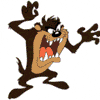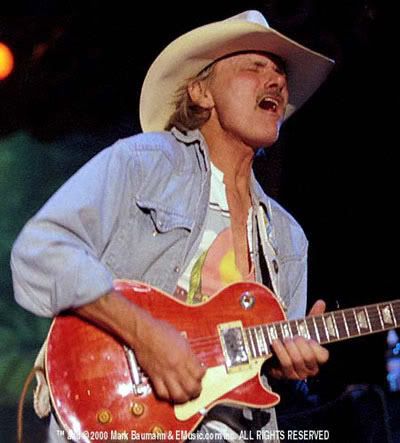Post by cofi on Nov 23, 2007 11:58:15 GMT
[shadow=red,left,300]GUITAR WORLD - December 2006 - Fans ask Dickey Betts their questions
[/shadow]
[/shadow]
Dickey Betts - He's Famous for playing alongside Duane Allman in the Allman Brothers Band but what Guitar World Readers really want to know is...................................
Your beautiful instrumentals like "Jessica" and " In Memory of Elizabeth Reed" say so much without uttering a word. DO you set out to write an instrumental, or is the decision made as the song develops? - Joshua Smith
DB: I set out to write them. It is a totally different approach. I don't really have a specific technique, but I put in hours of deliberation as to what notes should follow each other, in order to get the best phrase that will communicate an emotion and thought without words. One exception is "Revival," which was suppose to be an instrumental. As I was writing the thing, I got going and started singing, just screwing around. I liked the words that came out of my mouth, so I stopped working on it as an instrumental.
Guitar World's Andy Aledort is now in your band. What does he bring to the table? - Dave Kann
DB: Andy is really a great guitar player and a pleasure to play with. Finding the perfect partner is a complicated thing. I've worked with a range of talent in my band and in the Allman Brothers, and I've found that the guy whose licks are less flashy will be much better to play with. Andy has a million licks, but he knows what he's doing and doesn't try to outplay you just to prove he can. He'll intimidate the hell out of you, but not because he's trying to. He gets in there and does his job and plays great solos.
As a father, I am interested in how you view you son Duane's career. Were you pleased to see him pursue a career in music, and what kind of impact did you have on his playing style? - John Katic
DB: I'm sure I had a great impact on Duane's style, but it's hard for me to say exactly how. He just left my band with my blessing to go record with Puddle of Mudd. It was great having him in the band for the past two summers. During that time, we got to know each other a lot better. We've played together around the house for years but it's very different to play in front of an audience, where it really means something. It brought us closer. He's a hell of a guitar player, and brings a youthful energy to my band that I really get a kick out of.
Your guitar tone is amazing. What is your stage setup? - John Henderson
Equipment has its purpose when it comes to satisfying a guitarist's tone requirements. But having said that, players like me and Carlos Santana, and past greats like Jerry Garcia and Duane Allman, can pick up any guitar and plug into any rig and sound like ourselves. Your technique, vibrato and choice of melody have alot to do with your sound. Having said that, I'll point out the obvious: no professional guitarist uses transistor amps; you've got to use tubes. I think the biggest thing that makes my sound is that I use Lansing speakers, which are really clear but will distort when pushed. Other than that, I use stock Marshall amps that are biased for a little more treble, because the standard setting is pretty bassy. And I don't use a lot of outboard stuff. I'll sometimes use a wah, but in general I don't like pedals, because I'm trying to utilize the sound of a real good piece of wood: my Gibson Les Paul.
Can you recall anything that Duane Allman said about your playing? - Dave Lucas
DB: We talked about guitars and playing constantly, so it's hard to recall just one thing, but Duane was always very complimentary to me. He would really get upset when people didn't recognize I was a lead guitar player. A lot of people assumed Duane was the lead player and I was the rhythm guy because of the name of the band and because he was so charismatic and I was more laid back. That really upset Duane. He would always say, " You don't realize this cat played that, not me. There's two guitar players in this damn band!" He would really stick up for me, going out of his way to make people aware we were twin guitars.
Between Duane Allman, Warren hayned and Derek Trucks, who brought out the best of the Allman Brothers Band? - David Bubash
DB: Well, come on now. Hands down, Duane Allman is the guy that brought the most to the Allman Brothers Band, and there;s no comparison. Duane had his own original unique sound, and so does Derek Trucks, who has always reminded me of Duane. In fact, I think he tries too hard not to sound like Duane, and I wish he would just go ahead and play. My only other wish with Derek is that he would play more blues in his own band, because he is phenomenally good at that music and I feel he avoids it. But Derek had truly got his own voice and original playing style.
How did you and Duane work out your guitar harmonies - Todd
DB:It was really natural. Duane would almost always wait for me or sometimes (bassist Berry) Oakley to come up with a melody, and then would join in with the harmony. We did alot of it on the fly. If I played a riff twice, the third time he would be right on it with the harmony. We almost never sat down and figured out the notes; we just did it. And if you listen carefully to a lot of the harmonies Duane played, it's not the correct notes you would choose if you wrote it out, but it always sounded great.
I love the way you set up push-pull rhythms, as on "No One to Run With." Can you please describe that a bit? - Booger Nelson
DB:Duane and I were very conscious of how a drummer plays rhythm on a snare drum by utilizing a lot of counterpoint and interplay. We would try to do the same thing with our dual rhythm parts. For instance, I could start something with a push on a 2 and 4 beats, and he would play on the 1 and 3. We were very aware of really each person's downbeat appear in different spots so they didn't get tangles up. That's beacuse Berry's pleaying was really busy, as well; he wasn't just playing the bass line. By working the rhythms like that, you create a back-and-forth feel, almost like a guy playing a snare drum with both hands, Duane was really more adept at that type of thing than I was, because he had put in time doing session work. I learned a lot of that from him. "No One to Run With" is a newer song that utilizes ome of the same ideas.
What was the biggest stylistic difference between how you and Duane played? - Darden Copeland
DB: The perfect guitar voiced we heard in our heads were polar opposites. He like a real spitfire trebly sound, with staccato phrasing, and my thing was more of a rounded sound. That reflected itself in different ways and helped us develop a great sound together. I played mostly on my neck pickup, and Duane always played his leads on the treble pickup. His melodic sense came mostly from jazz and urban blues, while mine came from country blues, with a strong element of string (bluegrass) music, because my dad played fiddle. Therefore, my phrasinghad more of looping style, while Duane's was more cutting. We were almost totally opposite, except for we both knew the importance of phrasing. We didn't just ramble about.
I really like some of the new songs you have been introducing at shows. Any plans to record? - Sam S.
DB: I'll probably make a live album. The record industry is in sach a confused mess, right now. It's not really a time to sign acts and put out records. It;s a different world out there now, and I probably won't do a studio album unless a record company wants to budget the thing, but I have a lot of new material ready to go.
What made you guys laugh when Jim Marshall shot the photo for the At Filmore East album cover? - Kostas Xanthakis
DB: Jim wanted the light to be perfect, so we had to get up at daylight. We were all in a real grumpy mood, figuring it didn't make a damn bit of difference what time we took the picture. A dude Duane knew cam ewalking down the sidewalk on his way home after working all night. Duane jumped up, ran over and got a joint from this guy, then ran back to take his place with the rest of us. He had just copped a toke and had a mischievious grin on his face. We all just cracked up. If you look, you can see Duane is hiding something in his hand.
What inspired you to write "Blue Sky," and did you play all the guitar parts on the recording? - A.S.
DB: Hell no, I did not play all the guitar parts. Duane is very much on it. It was one of the last things he ever recorded. I wrote it for my wife at the time, who was Native Americanand whose name translated to "Blue Sky." It was originally a love song to her, but once I wrote it I realized how nice it would be to keep the vernacular "he's" and "she's" out and make it like you're thanking the spirit for the day.
On the Allman Brothers' earl;iest recordings, you all sound like seasoned veterans. How were you able to become so proficient at such young ages? - Scott Trezak
DB: Man, I don't know. The young guys in my band ask me that all the time. For being such young cats, we really had some good players, and Duane and Berry Oakley had incredible leadership qualities. I was a couple of years older than everyone, but we were all basically kids. The only explanation I can give is that we were a nightclub band, not a garage band. We had brought ourselves up by actually playing in the bars in front of audiences, and that really gives you a lot more depth than if you just play in a studio or garage before you make records. Duane and Gregg were on the circuit as teenagers, and my first road gig came when I was 16, playing in a band that traveled to state fairs and such. We had a tent show called "Teen Beat." and we played on the midway. We did 15 30-minute shows a day, sometimes. We played stuff like Little Richard and Chuck Berry, and I did splits and duck walks. We would get on each other's shoulders, and we'd slide across the stage on knees, wearing kneepads hidden under our pants. (Laughs) All those gigs paid off.
Taken from Guitar World




